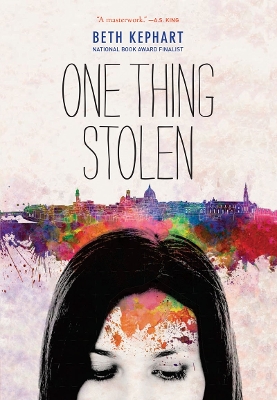
Jo
Written on May 25, 2015
When I heard about One Thing Stolen by Beth Kephart, I was originally put off by the fact that Nadia is a thief. Stealing is not something I have any time for. But the words "rare neurological disorder" piqued my interest, and I just had to read it - and it's absolutely beautiful!
Nadia is having a difficult time. She's finding herself changing, and she doesn't know why. She's having difficulty speaking. She's stealing, and she can't help it. The compulsion to steal is not something she can control. She's become obsessed with birds and nests. There's a boy who's caught her eye, but nobody else has seen him. Her thoughts jump about, and she feels she's slowly disappearing. In Florence, she loses herself. But will she be able to find herself again?
One Thing Stolen is a really interesting story. When Nadia is narrating, it's almost lyrical. Such beautiful prose is used as she shares with the reader her thoughts, as we see her jump from focusing on now to memories. There are no speech marks when people talk. It's a little jarring to realise someone is talking to her, and she's not actually thinking at that point, but it's a great way to show the confusion Nadia feels. She is obsessed with birds and nests, and has a compulsion to steal, using the things she's stolen to create beautiful, intricate nests. She has trouble communicating; she understands everything everyone says, and her thoughts are complete, but she is unable to get the words out of her mouth properly. And she constantly feels like she's disappearing. She seems to talk to the reader; see this, remember this, I'm here, I'm real - this is real, isn't it? She's just not sure. And it doesn't help when she meets Benedetto, yet no-one else has seen him. Surely he was there, right? Did she make him up? She can't be sure, but he seemed so real. She's so scared of this person she's becoming - or, as she feels, unbecoming. She feels she's losing a bit of herself every day, and doesn't know how to hold the pieces of herself together.
The narration changes once Nadia starts getting help, and the story is now told from the point of view of her best friend, Maggie, who has come to Florence to help her. Here, the writing becomes what you expect from your general YA novel; we get speech marks back, we get a typical teenage voice. The contrast is brilliant; showing how Nadia's mind is works against a teenager who has no mental health problems. I'm not going to go in to what's wrong with Nadia, because we don't find out for quite a while, and I think you should get to know Nadia, her mind, her story before labels are put on her. She's unique, and your heart breaks for her as she tries to work out what's real, and as you see her try to work at improving. It's a really beautiful story.
Florence. Oooh, Florence! The descriptions are lush and beautiful, and I felt like I was there - I could see it all (and now somewhere I want to visit). There is quite a lot of mention of the flood of 1966, which Nadia's father is there to write about. It's the reason they're all there, and so it's discussed a lot. Although the flood was devastating and horrific, I found myself simply not interested in it. I just didn't care in comparison to what was happening with Nadia, with her trying to get help, trying to work out if Benedetto was real. I kept thinking, "Why are you talking to her about the flood? Why aren't you discussing what's going on with her? How is talking about this flood going to help her?" I just didn't get it. In the Acknowledgements, the author talks about her interest in the flood, which makes all the references to it make sense, but I just didn't think it was as important as Nadia's story. It frustrated, but I guess that's what partly inspired the story. If there was no flood, they wouldn't be there, and the story would be different.
One Thing Stolen is a really beautiful and poignant book, with a great look at a rare neurological disorder. I loved it.
Thank you to Chronicle Books for the review copy.
